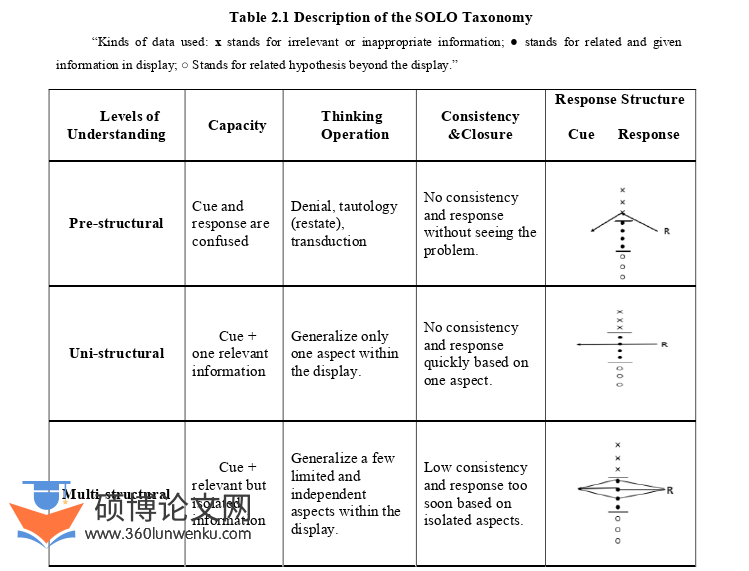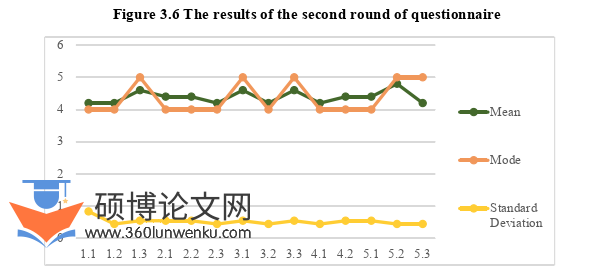本文是一篇英语论文,笔者认为教学设计关注学生语言知识的积累和阅读技能的训练,从思维层面深度解读文本的学习任务较少。针对学生深度学习情况,作者提出了以下教学建议:基于文本解读和学情分析,确定深度学习目标;设计体现深度学习特征的学习活动;依据深度学习目标,设计课堂评价方案。
Chapter One Introduction
1.1 Research Background

英语论文怎么写
With the intensive use of the Internet, the speed of knowledge generation and elimination is accelerating at a fastest-ever rapid, and more and more people realize that learning is not just about recalling knowledge, but pondering and generating new knowledge; learning is not just about getting high scores, but preparing for future social life and applying what you have learned to solve real-world problems (Wiggins & McTighe, 2008). Facing the new economic model and new job market environment, there comes the new characteristics and needs for social life and personal self-realization, so that cultivating the key abilities and necessary characters, that is, the key competency, to adapt to future social development and personal life-long development, has become the prime goal of international education reform (Guan, Chen & An, 2021). Since the Organization for European Economic Cooperation and Development (OECD) put forward the concept of core competency in 1997, countries (regions) and international organizations around the world have been regarding it as the "gene" of primary education and the guideline for talent training to promote the implementation of educational goals and to improve the quality of education. Constructing the framework of "core competency" has therefore become a general trend of international curriculum reform, such as the "Five Pillars" of UNESCO, the "Eight competencies" of the European Union, the "21st Century Skills" of the United States, and the "Seven Comprehensive Competencies" of Finland, etc. (Voogt & Roblin, 2012). The Ministry of Education of my country primarily proposed the concept of "core competency" in 2014, and promulgated the comprehensive framework of cultivating core competency of Chinese students in 2016, manifesting the elementary education reform officially enters a new era of core competency.
...........................
1.2 Purposes and Significance of This Thesis
Deeper learning has been increasingly becoming an inevitable choice for the education reform in the 21st century, and deeper learning assessment, as a yardstick, has also received a substantial achievement. However, firstly, the research on deeper learning is a young field at home and existing researches prefer theoretical studies; secondly, the research on constructing deeper learning criteria from the perspective of junior high school English discipline is slightly thin. Therefore, combing with the New English Curriculum Standard and China’s Standard of English Language Ability (Ministry of Education, 2018), this research attempts to construct a deeper learning tool based on the SOLO taxonomy and apply it to conduct a case study on student’s deeper learning process and quality in junior high school English reading class.
The significance of this thesis can be divided into theoretical one and practical one. Theoretically, this research could enrich the theory of deeper learning and English reading, and could make the deeper learning theory more practical and feasible in junior high school English learning and teaching. Practically, this study may, first, provide a reference for front-line English teachers to carry out assessment and ways of optimizing the design of learning activities in English reading class; second, provide students with a tool of self-assessment to monitor and adjust their learning process in English reading class; third, the scope for the practical study of deeper learning, especially of deeper learning assessment, could also be broaden.
..............................
Chapter Two Literature Review
2.1 Introduction to Deeper Learning
2.1.1 Definition of Deeper Learning
In the 1970s, deeper learning was introduced to educational field. With regard to the definition of deeper learning, it can be generalized into two perspectives. First, deeper learning is a process targeting meaningful understanding, which requires active learning engagement, and involves higher-order cognitive strategies. Marton and Saljo (1976) consider that deep learning focuses on meaning understanding while surface learning focuses on mechanical recalling and memorizing of information. Biggs (1979) maintains that deeper learning involving students’ active and independent understanding, connecting and constructing, pursuing of basic principles, critiquing, reflecting on and applying relevant evidence. Rossum and Schenk (1984) argue that deeper learning is about meaning understanding and meaning constructing, which is beneficial to the transferring of knowledge and skills. Professor Guo Hua (2018) emphasizes that deeper learning is a meaningful learning process in which learners actively and fully engage themselves in such challenging leaning tasks as questioning, criticizing and evaluating the learned knowledge to experience success and gain development with the guidance of teachers. Similarly, Cui Yunhuo (2017) defines deeper learning as a way of learning involves a high degree of engagement and cognitive participation to gain meaning in a complex environment. Specifically, Fredricks (2014) points out that deeper learning is a process which fully engages learners’ cognition, emotion and behavior. Behavioral engagement includes non-destructive behaviors, positive learning behaviors, participation in classroom learning and extracurricular activities; emotional engagement includes positive emotional responses to schools, classes, and teachers, and a sense of belonging and value; cognitive engagement includes psychological engagement and the use of cognitive strategies in learning.
..............................
2.3 Introduction to SOLO Taxonomy
2.3.1 Structure of the SOLO Taxonomy
The full name of SOLO taxonomy theory is "Structure of the Observed Learning Outcome", which is derived from Piaget's theory of Cognitive Developmental Stages. Piaget believes that children's cognitive development has four stages sequencing from simple to complex: sensorimotor stage, preoperational stage, and concrete operational stage. and formal operational stage. Biggs and Collis (1982) call it a hypothetical cognitive structure because they found in their research that: 1) students' cognitive development is complex and irregular, and Piaget's taxonomy cannot accurately determine in which developmental stage students are. For example, some students are in the formal operational stage when answering a certain question, but they are in the preoperational stage when answering another question, and the level of cognitive development of the same student in different subjects is not fixed either; 2) the generalized cognitive structure is not directly measurable and is analogous to ability and IQ which is relatively stable over time and independent of instruction. Conversely, an individual's response to a particular learning task is measurable at a particular time and is analogous to attainment and depend on instruction and other factors like motivation, intention, learning strategies, etc. Therefore, they inherit Piaget's idea that "individual cognitive development progress from simple to complex", but revise and develop it.
Focusing on students’ learning outcomes of specific learning tasks, Biggs and Collins have established the SOLO taxonomy which contains five hierarchical levels from such four dimensions as capacity, thinking operation, consistency and closure, and response structure, ranging from pre-structural level, unistructural level, multi-structural level, relational level to extended abstract level. The spiral change from the pre-structural level to the extended abstract level marks the developmental process of students' learning quality from surface to deep.
.............................
Chapter Three Research Methodology ........................ 27
3.1 Research Questions .................................. 27
3.2 Research Participants ........................... 27
Chapter Four Results and Discussions ............................. 39
4.1 Students’ Deeper Learning Quality in the First English Reading Class ................ 39
4.1.1 Analysis of Students’ Overall Situation of Deeper Learning ......................... 39
4.1.2 Students' Deeper Learning Situation in Terms of Academic Differences ...... 42
Chapter Five Conclusion ................................ 55
5.1 Research Findings ................................. 55
5.2 Suggestions of This Research ............................ 57
Chapter Four Results and Discussions
4.1 Students’ Deeper Learning Quality in the First English Reading Class
In section A (2a-2c) of unit 5, book2, which is from go for it English of junior high school, Mr. Xu adopted the PWP reading model to design three task groups and set up the following learning objectives: after this lesson, students are able to: 1) Share their understandings of the Beijing 2022, including the spirit of the Olympic and meaning of the Olympic ring and predict the textual content by using the title as a clue. 2) Get the basic information about the text, including “who, what, where” of the text through careful reading. 3) Figure out the textual structure. 4) Master the meaning of some new words, such as dying down, against, fallen, broken. 5) Think about what else can bought people closer together and what actually brought people closer together, and freely express their opinions on how to help each other in times of the COVID-19 pandemic.
4.1.1 Analysis of Students’ Overall Situation of Deeper Learning
There are totally 53 learning tasks which has 70 responses, among which there are 58 comprehension responses corresponding to the 32 comprehension tasks. The 5 sample students represented 14, 12, 13, 12 and 11 comprehension responses respectively. And students Y represented 16 comprehension responses. The 53 learning tasks mainly center around three learning activities—what, how, and why. Among the 58 responses which correspond to the 32 comprehension learning tasks, there were, in total, 44 responses at level 1, level 2, and level 3, a staggering 76%. Conversely, 14 responses reached the level of relational and extended abstract, making up for about 24% of the learning outcomes, indicating that student's achievement was mainly a surface learning.

英语论文参考
..............................
Chapter Five Conclusion
5.1 Research Findings
The core issue of this study is to construct an assessment tool for deeper learning in junior high school English reading class based on the SOLO taxonomy and apply it to assess the quality of students' deeper learning. The previous chapters have described detailed findings around this core issue, and now the main findings and conclusions are summarized.
From the foregoing discussion on deeper learning, it would be concluded that in the era of core competency, more emphasis is attached on students' in-depth understanding of knowledge. More precisely, there is a need to pursue understandings with height, depth, and warmth. To achieve this kind of understanding requires the guidance of teachers and the active participation of students; and teachers are supposed to design learning objectives and corresponding learning activities to promote deeper learning, to integrate learning content, to create learning scenarios that are close to students' real life, and to choose scientific and correct learning assessment tools or criteria for promoting students' integrated development in higher-order thinking and skills as well as positive emotion and attitudes. From the perspective of teacher's teaching, deeper reading is to encourage students to sustain their reading, to understand texts, then self-construct knowledge, which not only can develop students' language ability, but also can enhance their learning ability, improve their thinking quality, and build their cultural awareness. From the perspective of student's learning, deeper reading means that readers carefully read the content of the text, figure out the information and ideas conveyed in the text, and communicate with the author, others and self, achieving positive life construction and obtaining the nourishment in knowledge and mind.
reference(omitted)
